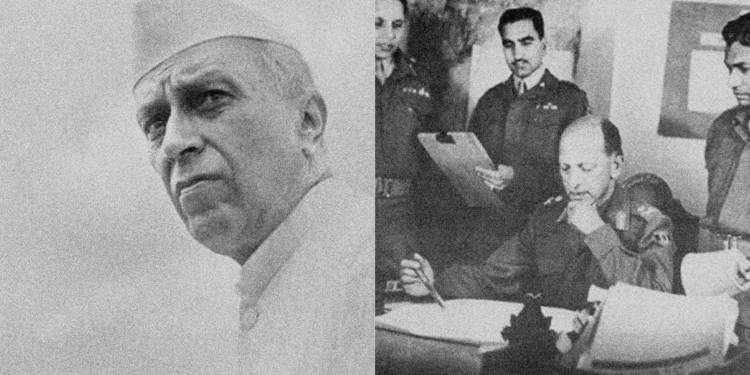The first Prime Minister of the country, Jawaharlal Nehru made many mistakes during his tenure, but one of the most glaring ones, which even his successors refused to rectify was the lack of a Chief of Defence Staff (CDS), who looks over at all the three forces of army, navy and air force. Since the time of independence, the country has lacked a CDS which PM Modi decided to rectify in his 2nd term by announcing the same during the 73rd Independence Day speech, in a landmark policy shift.
Nehru’s decision to avoid the post stemmed up from multiple reasons, the most obvious one being that of fear of an army coup. A military government, at least for a short while isn’t an uncommon occurrence in post colonial Africa and Asia and thus, fearful of giving the forces too much power, Nehru wanted to retain the power with the civilian establishment.
Thus, wary of the army, Nehru’s priority in the first few years of his Prime Ministerial tenure had been to ‘tame’ the armed forces. For this, a number of glaringly directed initiatives were taken, which included, assigning the Teen Murti House, traditionally the grand residence of the army chief, to the prime minister after independence, a series of budget cuts and the chiefs directly and indirectly told not to meddle in matters of the government. Apart from these, several subtle initiatives were also taken to ensure the armed forces remain subservient, including, diversifying the ethnic composition of the armed forces, setting up rugged command and control structures, re-casting the order of precedence between civil and military authorities, paying close attention to promotions, disallowing army officers from making public statements, creating a counter-balancing paramilitary force, and topping off this entire effort with little touches like ensuring that retired chiefs of staff are usually sent off as ambassadors to faraway countries.
However, the biggest of these had been his refusal to appoint a CDS. In 1947, the Government of India had suggested creation of a Commander-in-Chief for each service, as well as a Chiefs of Staff Committee to coordinate with the centre. However, this was discarded as after independence, the powers of the Supreme Commander given to the President of India as the Service Headquarters (SHQs) were placed as attached offices under the Ministry of Defence (MoD), ensuring decision-making remained under civilian control.
The ostensible reason for this was to ‘coup-proof’ India, i.e. army cannot stage a coup and take over the country. While Nehru gave various illustrations for this need, specifically by taking the example of Pakistan, the moves were highly politicized. The real motive behind the ‘coup-proofing’ was Nehru’s hunger for power and his paranoia against the army.
This paranoia of Nehru cost the country and its armed forces a great deal. The impact of this ‘purge’ like initiative was visible during the 1962 humiliation where impoverished, un-coordinated armed forces fought against a well organised Chinese army and India faced defeat. In spite of Mountbatten urging Nehru to create a CDS prior to the war, Nehru had incessantly opposed such a post because “it would give to the Indian politicians the idea of perpetuating the idea of the great ‘Commander in Chief in India’, of whom the last one, of course, was Field Marshal Auchinleck.” The appointment of Krishna Menon, the arrogant and psychotic close confidante of Nehru, as defence minister had not only subdued the armed forces, but had also largely led to this defeat.
Despite the loss, Nehru refused to change the policy towards a more unified armed forces. After the 1965 war against Pakistan, General P.S. Bhagat highlighted the lack of coordinated defence staff and the manner by which civilian leadership was developing military policies without consulting the military. Bhagat warned, “Whatever the circumstances, it should be clear that at no stage should political objectives be fixed which are beyond the military means of the country.”
Despite the defeat, the paranoia of Nehru was so much that he refused to yield to the demands of much experienced individuals to appoint a CDS and successive governments continued this trend.
The much needed action was taken in this direction after the formation of the Kargil review committee in which K. Subrahmanyam’s report reviewed the Kargil war, the events leading up to it and also offered recommendations for the future. The report highlighted several shortcomings that stemmed from a lack of coordination between services.
As per the recommendations of the Kargil review committee, a national security advisor (NSA) was appointed and an Integrated Defence Staff (IDS) was formed. The integration of service HQs with the MoD, as opposed to being “attached” offices under it was also a revolutionary policy change.
The creation of the CDS however, though recommended by the Kargil review committee, remained largely on the back burner, until the Naresh Chandra Committee was appointed in 2011.
Now, in a bold decision, the Modi government has announced the appointment of CDS in the country. One of the glaring differences between this government and the previous governments has been the free hold over the army. The armed forces have been given wide decision making powers, which is why the militancy and terrorism has been curbed in the country with an iron fist. This bold attitude of the government and more than that, the coherence between the centre and the armed forces led to the multiple strikes on terror camps.
Now, continuing with the same attitude of putting national security over petty politics and paranoia first, the NDA government has changed the defence policy in a revolutionary way. This shows the kind of self-confidence Modi government has in the civilian leadership and the trust it has with the armed forces. Unlike Nehru, the popular mandate of Modi is the real ‘coup-proofing’ without compromising the efficiency and integrity of the armed forces, thereby affecting the national security.

























